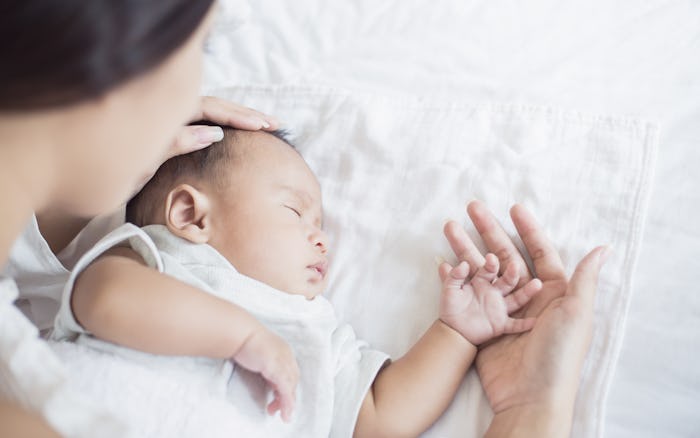Life

Here's How To Determine If Your Baby Has A UTI
One of the scariest moments of my life was when I received a phone call from the children’s hospital my 2-month-old son was taken to the day before for a fever, and they told us we had to bring him back to the ER ASAP because he had trace amounts of E. coli in his urine sample they were watching. I felt horribly guilty for letting them discharge us, but once we had his fever under control, I thought we were OK. On the way back to the hospital, I kept trying to Google signs of a UTI in babies. Was there anything I should have noticed other than the fever? What could I have done differently? And more importantly, how will they treat it and will my baby be OK?
Dr. Danelle Fisher, vice chair of pediatrics at Providence Saint John's Health Center in Santa Monica, California, tells Romper that the most common signs of a UTI are fussiness due to discomfort, a fever, and/or vomiting. And Dr. Matthew Coulson, a board-certified pediatrician at MemorialCare Medical Group in Laguna Hills, California, adds that “the number one reason to suspect that an infant may have a urinary tract infection is having a fever without an apparent source … Since babies cannot talk, they cannot tell you that it hurts to urinate." He tells Romper that because babies aren't potty-trained and just pee after most feeds, looking for a symptom like incontinence or the frequency of your baby's urination isn't helpful. "Ultimately, a clinician needs to evaluate an infant with a fever and determine the likelihood of a UTI as the source of the fever.”
So how do doctors test for a UTI? Fisher explains: “A urine sample will be obtained from the baby. The recommendation is to perform a catheterization with a sterile catheter, but that is not always feasible in some offices or clinics, so another option is to put a bag over the child's genitals and capturing a urine sample that way." Ah, parenthood.
But beyond all of that, UTIs aren't shrouded in mystery. And as far as me feeling like I should have done more to prevent my son's UTI, Coulson says parents should not feel guilty that the infection could have been prevented. “In general, UTIs in infants are simply bad luck,” he says. “Appropriate cleaning after bowel movements is important, since the infection is typically from bacteria that live in our intestinal tract.”
Fisher adds: “If your baby suffers from constipation, treating the constipation may help prevent a UTI. There are some causes of UTI that are not preventable, so it's important to make sure the baby does not have a problem with their kidneys or the urinary tract. The baby's pediatrician can tell parents if more tests are warranted and explain what those entail.”
Luckily, if your baby is older than 60 days, they can be treated with oral antibiotics at home. However, if your baby was 58 days old like mine was, they may be admitted to the hospital for 48 hours to receive antibiotics intravenously. “Babies younger than 60 days old are more susceptible to the bacteria that is causing the UTI and may end up with a generalized infection, which is more dangerous than the UTI. It is important to monitor these babies until they have had 48 hours of antibiotics, at which time the urine culture shows exactly which bacteria is causing the infection and another test then determines which antibiotics will kill the bacteria. At that point, treatment can be tailored to an oral medication,” Coulson explains.
Generally, the number one sign of a UTI is a fever with no other symptoms present. If your baby does have a fever, make sure to take them to the pediatrician so they can evaluate your baby for other potential causes. If their ears are clean, there is no vomiting or any other visible symptoms, they may test your baby for a UTI to either rule it out, or to start treating the infection. Thankfully, no matter how old your baby is, a UTI is very treatable with antibiotics if you catch it soon enough.
This article was originally published on